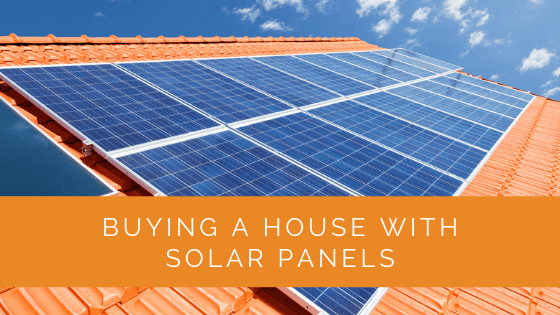Have you recently bought or are planning to buy a house with solar panels? If you are thinking of going solar, you are at the right place for sure. A solar power-driven home has several attributes that differ largely from traditional houses.
You must be aware of these factors, property value, energy production, and nitty-gritty involved in buying a house with attached solar panels. Read as we take you through a quick guide of all things solar panels installed homes. Let’s get started shall, we?
Contents
- 1 Key Takeaways
- 2 Benefits of Buying a Home with Solar Panels
- 3 Disadvantages of Opting for a Solar Energy System House
- 4 What are the Main Types of Solar Panels in the Market?
- 5 A Quick Guide to the Top Questions You Need to Ask
- 6 Case Study: Navigating the Purchase of a Home with Solar Panels
- 7 Expert Insights From Our Solar Panel Installers About Buying A House With Solar Panels
- 8 Experience Solar Excellence with Us!
- 9 Bottom Line
Key Takeaways
- Buying a house with solar panels can offer several benefits, including lower electricity bills, low maintenance, longer lifespan of panels, and increased home equity.
- However, there are potential disadvantages to consider, such as critter interference, reduced effectiveness in areas with limited sunlight, the need for occasional part replacements, and additional expenses like roof repairs.
- The article also outlines four main types of solar panel ownership: owned panels, leased panels, panels financed through a solar loan, and PACE-financed panels. Each option has its own financial implications and considerations for buyers.
Benefits of Buying a Home with Solar Panels
Homes with solar panel installation have an array of advantages. If you’re new to the entire solar panels’ jam, here are some of the benefits you will be enjoying.
Lower Electricity Bills
With a solar installation at your abode, you will experience lower energy bills. The magnitude of how much electricity consumption will be reduced would largely depend on the amount of solar energy generated by the panels. You will also take into count how the utilities charge for the electricity.
Rest assured, your energy bill won’t disappear entirely, but it will turn to a smaller and more stable value. You will save money once you become a customer of the solar industry!
Extremely Low Maintenance
This is a significant benefit for all those people stuck with busy lifestyles. Installing a solar panel in your house will reduce the time and effort spent running the electrical appliances at your place.
The only exception would be if you live in a dusty place, otherwise, the rain is mostly enough for the cleaning process. On top of that, the maintenance gets cheaper as well.
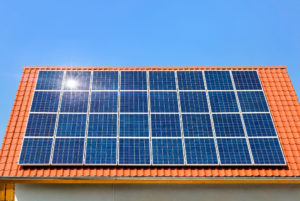
Longer Life Spans
With a solar panel installed home, the solar panels outright become the last thing to worry about! Most well-built solar panels have a life of 25 years or even longer. This aspect becomes essential of the house you buy has solar panels that have been attached a long while back.
As long as their life span is left, generating electricity will be no biggie for the panel.
Greater Home Equity
Solar panel attached homes generally have a higher value in the market. Statistics show that the value increases by 4% or at least $4 per watt used. Moreover, it also increases the overall features of the house, further making it a hit amongst the new home seekers.
Disadvantages of Opting for a Solar Energy System House
While there is a ton of positives involved in having a solar panel system attached to your home, there are a few negatives as well. It is best to do a cost-benefit analysis and determine your requirements first. Once you know, what you are okay and not okay with, the decision to opt for a house with solar panels becomes easier.
The Critter Mess
This is a negative aspect of solar systems in your house if squirrels or rats are nearby. You never know they might choose to build a nest in and around your panel. In such a situation, they might even chew wires and can cause a burn in your pocket amounting to the repairs.
The best option is to go for a critter guard around the panel. You can call a handyperson to attach them and ensure they don’t step on the solar panels themselves.
Without the Sun, they are…
However brash this may sound, a solar system is basically useless without the sun. If you live in a city or place where the daily sunlight hours are low, it is best to steer clear of homes with solar panels.
However much the benefit of the solar system would be, you will end up spending way more on the installation or maintenance costs.
Some Parts would Require Replacement
This factor varies according to the solar company, but a few parts of the solar system will have to be replaced after a period of time. These parts are generally the central inverters. While the microinverters and the solar power optimizers have a 25-year long warranty, the central inverters could have one that would last about 12 years.
It is best that you make your budgets for a replacement of the central inverter, about the midlife of the actual solar panel’s life.
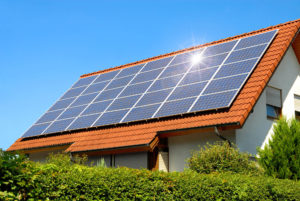
Extra Expenses
Solar panels are meant to be more cost-effective and should help you in saving some of your hard-earned money. But that might not always be the case. For instance, it could be possible that the tax breaks are expired or will be in expiring in a while. So, it is of utmost importance that you take care of these factors.
Moreover, there could be other situations like a roof leak or a roof replacement on the cards. Without a solar panel, this could have been done easily.
But, now that you have a solar power-driven home, you will have to remove, store and replace the panels. The cost for this process is highly variable, but on average, you will be looking at a price of at least a few thousand dollars.
If you’re buying a new house, it is best to check whether or not the builder installed suitable roofs to save yourself from those extra expenses.
What are the Main Types of Solar Panels in the Market?
Generally, solar installations in homes could vary based on the ownership and financial aspects. Overall, there are four main types of houses with solar panels:
- Owned solar panels
- Leased solar panels
- Solar panels bought through a solar loan
- PACE financed Solar panels – Property Assessed Clean Energy
Buying Owned Solar Panel House
First up, we have homes with owned solar panels! These are probably the most common types of houses for solar panel systems.
You can consider this as the best situation wherein while you buy the house from the previous owner, you also buy their solar panels. These panels are wholly owned by the seller who comes to you directly once you buy the house.
The only negative of buying an owned solar panel home is that you might end up paying some extra bucks. But, that also works well in the long term as long as the solar panels are fit and fine!
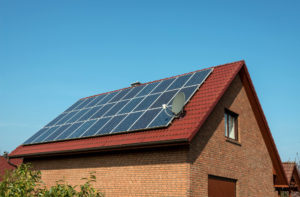
Buying Leased Solar Panel House or PPA
Like fully owned solar panels, this is another common option available in the market when you are hunting for solar panel attached houses. Leased solar panels refer to the fact that the current homeowner sends the monthly payments of the solar panels to the utility company.
In such situations, we strongly recommend understanding the conditions of the solar panel leases and if there are any other requirements. Having a look at the original lease contract of the solar installation company is essential as well. Moreover, you must also ask some important questions to make sure that you’re making the right decision.
For starters, getting a figure for the monthly fees of the leased solar panels is the right way to start. Since a Solar lease is usually paid in a monthly system, as you shift in the house, you will be required to make those payments. Additionally, these monthly solar lease rates tend to increase every year with the growing popularity of leased solar panels in homes.
So, in such as case, do check if the payments are also increasing or not. If they are, it is crucial that you have information on the change in payment over the lease period. Keep a note of the lease term. On average, a solar lease will usually carry for a period of 20 years, but it is subject to change.
A tip here would be to check how long has the lease process been up to when you buy the house. According to this factor, the cost and the liability timeline can largely vary.
While asking all these questions is vital, please be mindful of your own budgetary constraints. In case you decide to buy a house with a leased system, you might want to check if it raised your debt-to-income ratio. If yes, there is a high chance that you won’t be able to qualify for a mortgage on an acquired solar lease.
Now, if you are content with all the lease terms and your financial situation can manage a solar system lease, you are good to go. In such a case, the solar company will just transfer your name in the lease, post you pass the credit check.
Moreover, if you are not okay with the present lease, you can negotiate with the current owner and try to come to a middle ground. You can ask if they can compensate you instead. Or if there is also a possibility for them to pay off the lease’s remainder, diminishing the entire issue.
Buying Homes with Solar Panels Financed Through a Solar Loan
Solar loans are a sweet spot for those buying homes with solar panels. The best part is that you don’t need to worry about its payments or details. Unlike solar leases, a solar loan is the liability of the previous owner, and it is their duty to pay it off.
So, it is safe to say that a solar loan financed home involved the least bit of chaos. On the other hand, do expect a higher asking price. That goes without saying because you will be enjoying the benefits of the solar panel even if you aren’t particularly paying for it.
Moreover, owing to the large long-term benefits, you should be okay with paying this elevated price!
Buying a Home with Solar Panels that are PACE Financed
PACE financing is pretty different from all the options we have discussed so far. As loans are attached to a person, PACE financing is coupled with the property rather than the person who opted for the loan.
The payments for PACE loans go with your property taxes. What this means is that when you buy a house with PACE financed solar panels, you are required to make the payments thereon. If you want to check this option in detail, go check out PACEnation.
It is best to chat with the financing company before you zero down on the final purchase of the house with PACE-financed solar panels. Moreover, at the moment, the option to go for PACE financed solar panels in homes is only valid with California, Florida, and Missouri.
While PACE payments might look too much to ask right now, the reduced electricity bills and their benefits are way more than the extra assessed value which will be added to the property taxes. In the end, even if you end up paying the PACE loan’s remainder, you will still enjoy a net financial gain.
A Quick Guide to the Top Questions You Need to Ask
Here is a list of the top 4 questions you should be asking before you sign those contract papers and buy the house of your dreams. Solar panels, for the most part, are advantageous, and by checking some details here and there, you are bound to make the right decision, my friend!
Are the Solar Panels Removable?
If you’re buying a house with owned solar panels and you don’t want them, it’s best to ask the present owner to get the solar panels removed and then buy it. If the owner is on board with this idea, you may have to pay some extra bucks for the re-roofing process in the house.
In the case of a leased solar panel, you will just have to check the contract for the conditions to remove the solar panel. You might have to go through a buyout clause, depending on the agreement. This buyout costing is usually less than the monthly payments, but it can differ with various companies.
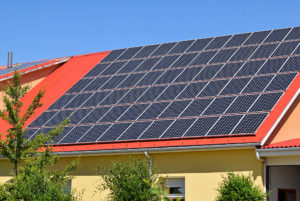
Do You Have Net Metering and Time of Use?
In case you buy a solar panel, you must check the net metering and if there is a time of use option available with the utility,
If you have net metering without any TOU, you will receive the entire credit in case any extra electricity is sent to the grid, irrespective of the time of the day.
On the contrary, if you don’t have net metering or have a Time of Use plan, it is essential to check when and how much electricity is generated by the solar panels.
What Is the Size of Solar Panels?
Size is a significant factor that can impact the functionality of the solar system. It decides the value you will end up saving on the electricity bills as well. You must check the value of electricity generated by the solar panels to match if it’s sufficient for your home or not.
Once you have a ballpark figure of the energy generation, you can also figure out the electricity that you will be selling to the grid.
What to Do if The Solar Panels Don’t Work?
There are two main scenarios in case the solar panels stop working. First is the chance that the solar panels are owned by not the homeowner but someone else. In this case, they are responsible for the maintenance as well. You will call the installer or company to pay the repair cost or simply replace the equipment.
The other situation is that you buy one house with owned solar panels, and they get damaged. In this case, it is you who would have to pay the fee for maintenance or the replacement. This also means that when you’re buying the house, do check on the electricity produced, monthly payment, date of installation, and if repair is an option for the solar panel parts.
Background
A client approached Solar Panels Network USA seeking advice on purchasing a home equipped with solar panels. The client wanted to understand the financial and practical implications of this investment. Our task was to provide a thorough assessment of the solar panel system, its benefits, and any potential costs involved.
Project Overview
The project involved evaluating a house with a 20-panel solar energy system. The client needed to know the type of solar panel ownership, the condition of the panels, and the financial aspects related to the system. Our goal was to ensure the client made an informed decision, balancing the benefits and potential costs of the solar panels.
Implementation
Initial Assessment
We began by reviewing the solar panel system’s documentation, including the ownership type. It was determined that the panels were fully owned by the current homeowner, which typically adds value to the property and simplifies the transfer process.
Inspection of Solar Panels and Roof
Our team conducted a detailed inspection of the solar panels and the roof. This included checking for any signs of damage, wear, or critter interference. We also evaluated the installation quality to ensure there were no issues that could lead to future problems.
Financial Analysis
We provided a comprehensive financial analysis, considering the following factors:
- Energy Savings: Estimated the reduction in electricity bills based on the system’s energy production.
- Maintenance Costs: Assessed potential maintenance costs, including any parts that might need replacement.
- Impact on Home Value: Evaluated how the solar panels influenced the overall property value.
Client Education
We educated the client on important aspects such as net metering, the lifespan of solar panels, and the benefits of low maintenance. Additionally, we discussed the potential need for roof repairs or replacements and how this could affect the solar panels.
Results
The client gained a clear understanding of the benefits and costs associated with buying a home with solar panels. Our inspection confirmed that the solar panels were in excellent condition, with no immediate need for repairs or replacements. The financial analysis showed significant long-term savings on electricity bills, enhancing the appeal of the property.
Summary
Purchasing a home with solar panels can offer substantial financial and environmental benefits. Our comprehensive assessment provided the client with the necessary information to make an informed decision. By considering the condition of the panels, the financial implications, and potential future costs, we ensured the client was well-prepared for their investment. At Solar Panels Network USA, we strive to empower our clients with knowledge and support, helping them navigate the complexities of solar energy systems in real estate.
Expert Insights From Our Solar Panel Installers About Buying A House With Solar Panels
Buying a house with solar panels can significantly reduce your electricity bills and increase your home equity. However, it’s essential to understand the type of solar panel ownership—whether it’s owned, leased, or financed—to make an informed decision.
Solar Energy Consultant
While solar panels generally have a long lifespan, the condition of the panels and the roof should be carefully inspected before purchase. This ensures you are not faced with unexpected repair costs down the line.
Lead Solar Technician
Potential buyers should also consider the local climate and sunlight availability. Homes in areas with abundant sunlight will benefit more from solar panels, maximizing the return on investment and energy savings.
Senior Solar Installer
Experience Solar Excellence with Us!
Trust in Solar Panels Network USA, where our seasoned experts deliver top-quality solar solutions for homes and businesses nationwide. With a legacy of countless successful installations and a commitment to sustainable energy, we’re your reliable partner in the solar journey. Ready for a brighter, eco-friendly future? Call us now at (855) 427-0058 and harness the power of the sun!
Bottom Line
So, is a solar panel installed home worth all the fuss? Yes, yes, and thousand times yes. But what matters is how you measure the various aspects of a solar panel, such as total cost, monthly fee, solar leases, size, net metering, installation costs, loans, etc.
Given these features match your requirements and constraints, going ahead with that solar power run home suggested by your real estate agent is definitely worth it! You get to enjoy financial benefits, the low electric bill, create renewable energy and earn money for the excess electricity while you’re at it.
About the Author
Solar Panels Network USA stands at the forefront of solar energy solutions, driven by a team of seasoned solar engineers and energy consultants. With over decades of experience in delivering high-quality solar installations and maintenance, we are committed to promoting sustainable energy through customer-centric, tailored solutions. Our articles reflect this commitment, crafted collaboratively by experts to provide accurate, up-to-date insights into solar technology, ensuring our readers are well-informed and empowered in their solar energy decisions.

